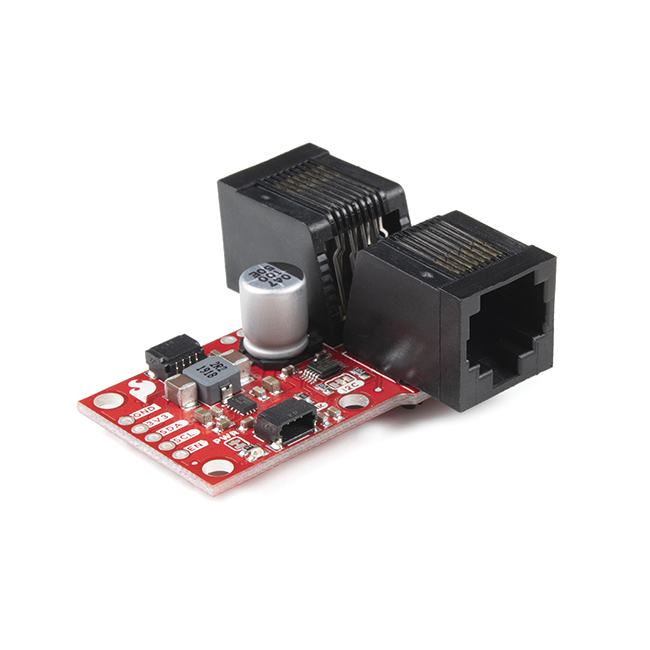SparkFun QwiicBus - MidPoint
The SparkFun QwiicBus MidPoint works in tandem with the QwiicBus Endpoint so you can extend the range of your I2C bus and easily tap into it to drop in devices wherever you would like. The QwiicBus uses NXP’s PCA9615 IC, which converts the two default I2C signals into four differential signals, two for SCL and two for SDA. The differential signals sent over Ethernet cables from the EndPoint connect to the breakout through the on-board RJ-45 connectors. The differential signaling allows the I2C signals to reach distances of up to 100ft. while still maintaining their signal integrity! To make it even easier to get your readings, all communication is enacted exclusively via I2C, utilizing our handy Qwiic system so no soldering is required to connect it to the rest of your system. However, we still have broken out 0.1"-spaced pins in case you prefer to use a breadboard.
The simplicity of the PCA9615 used on the QwiicBus boards is one of its biggest appeals. Other I2C communication methods require packetizing I2C communication into another protocol, be it RS-485 or 1-Wire. However, the PCA9615 keeps the I2C protocol by utilizing a differential transceiver.
The MidPoint also features a LMR33630 buck regulator users can enable to source larger amounts of current (up to [email protected]) to devices attached to the MidPoint.
The SparkFun Qwiic Connect System is an ecosystem of I2C sensors, actuators, shields and cables that make prototyping faster and less prone to error. All Qwiic-enabled boards use a common 1mm pitch, 4-pin JST connector. This reduces the amount of required PCB space, and polarized connections mean you can’t hook it up wrong.
Features:
- Uses the PCA9615 Buffer IC
- Includes the LMR33630 buck regulator for high-power applications
- I2C Supply voltage range 2.3-5.5V
- Differential Supply voltage range 3-5.5V
- Buck Regulator Supply Voltage Range: 3.6-36V
- Multiple power configurations depending on application needs
- 2x Qwiic Connectors
- 2x RJ45 Connectors
Documents:
- Schematic
- Eagle Files
- Dimensional Drawing
- Hookup Guide
- Datasheet (PCA9615)
- Datasheet (LMR33630)
- Qwiic Info Page
- Hardware GitHub Repository
Videos
| Manufacturer | SparkFun |
|---|




